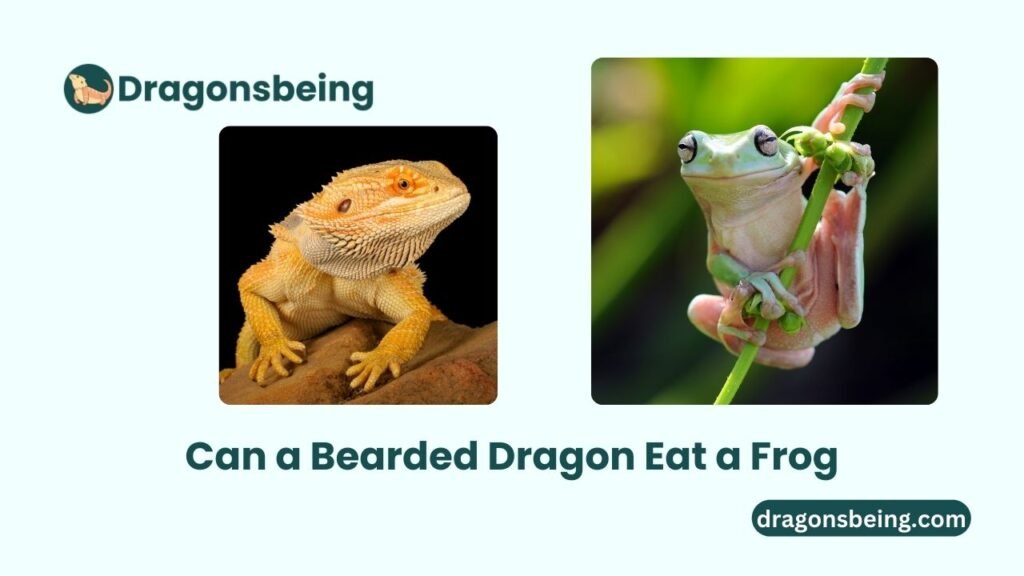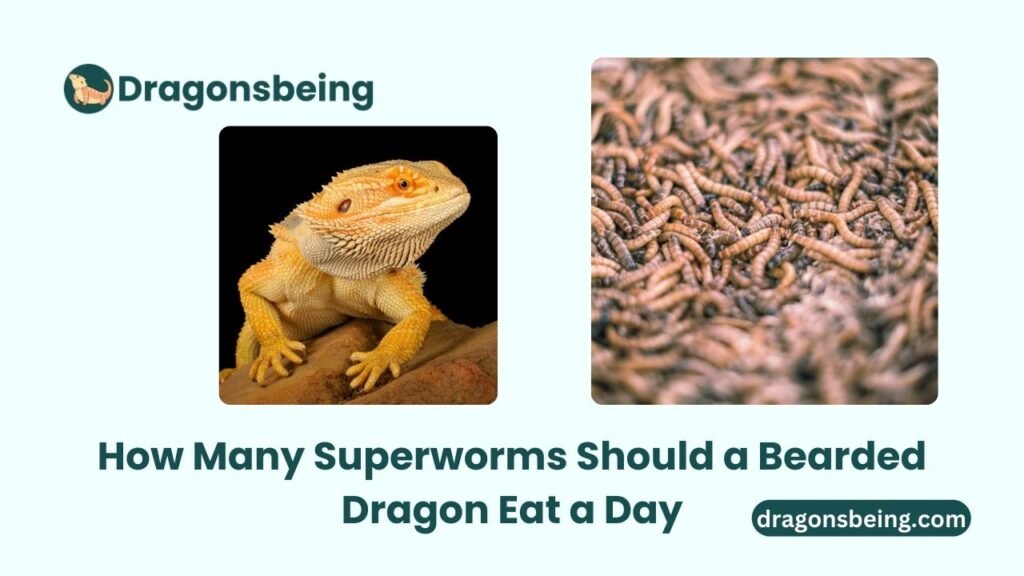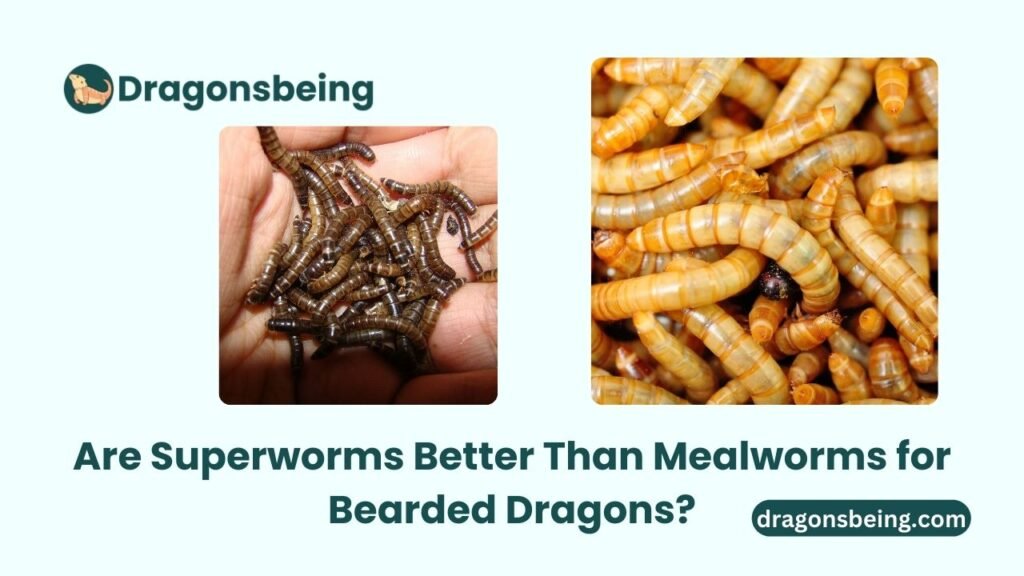Bearded dragons can eat frogs, but it is not recommended. Frogs may carry parasites harmful to your pet.
Bearded dragons are popular reptiles known for their unique personalities and dietary needs. Owners often explore various food options to ensure their pet’s health.
While these lizards enjoy a diverse diet, not all foods are safe. Understanding what bearded dragons can eat is crucial for their well-being.
Frogs, for instance, may seem like an exciting treat, but they can pose significant risks. A diet that includes insects, vegetables, and fruits is ideal for these reptiles.
Learning about safe and nutritious food options will help ensure your bearded dragon thrives in its environment. Prioritizing proper nutrition is key to keeping these fascinating creatures healthy and happy.
Why Owners Consider Frogs
Many owners consider frogs for several reasons. Here are some key factors:
- Natural Diet: Frogs are part of a wild bearded dragon’s diet.
- Variety: Frogs add variety to their meals.
- Engagement: Hunting frogs can stimulate a bearded dragon’s natural instincts.
- Availability: Frogs are often easy to find in pet stores.
Choosing frogs can lead to a happier, healthier pet. They provide a fun and nutritious option. Consider the benefits before adding frogs to your bearded dragon’s diet.
Risks Of Feeding Frogs To Bearded Dragons
Feeding frogs to bearded dragons poses various risks. Understanding these dangers helps you make safe choices for your pet.
Parasites And Diseases
Frogs can carry harmful parasites and diseases. These can transfer to your bearded dragon.
- Frogs may host protozoa that harm reptiles.
- Some frogs carry salmonella, which is dangerous.
- Infected frogs can pass on worms to your dragon.
Always check the source of frogs. Wild frogs are more likely to carry these issues.
Chemical Exposure
Frogs often encounter harmful chemicals in their environment. These chemicals can affect your bearded dragon.
| Chemicals | Effects on Bearded Dragons |
|---|---|
| Pesticides | Can cause illness or death. |
| Heavy metals | May lead to organ damage. |
| Pollutants | Affects overall health. |
Choose frogs from safe sources. Avoid frogs from polluted areas.
Digestive Issues
Bearded dragons have special diets. Frogs are not a part of it.
- Frogs can be too high in fat.
- Digestive systems may struggle to process frogs.
- Increased risk of obesity and other health problems.
Stick to safe foods like crickets and leafy greens. This helps maintain your dragon’s health.
Safe Feeding Practices
Feeding your bearded dragon properly is crucial for its health. Understanding safe feeding practices helps ensure your pet thrives. Avoid giving inappropriate foods, like frogs, which can pose risks. Here are some essential guidelines to follow.
Proper Food Sizing
Food size is vital for your bearded dragon’s safety. The food should be small enough to prevent choking. Follow these tips for proper sizing:
- Offer insects no larger than the space between the dragon’s eyes.
- Chop vegetables into small, manageable pieces.
- Use tweezers for feeding larger insects to control size.
Always supervise your dragon while it eats. This prevents accidental swallowing of oversized items.
Frequency And Quantity
Feeding frequency and quantity affect your dragon’s health. Young dragons need more frequent meals than adults. Follow these guidelines:
| Age Group | Feeding Frequency | Food Quantity |
|---|---|---|
| Hatchlings (0-3 months) | 3-4 times a day | Small amounts, as much as they eat |
| Juveniles (3-12 months) | 2-3 times a day | Moderate amounts, avoid overfeeding |
| Adults (1 year and older) | 1-2 times a day | Once a day, provide a balanced diet |
Adjust portion sizes based on your dragon’s activity level. Overfeeding can lead to obesity and health issues.
Alternative Food Options
Bearded dragons need a varied diet. Choosing the right foods is essential. They thrive on different types of food. Here are some great alternatives to frogs.
Vegetables And Fruits
Vegetables and fruits are vital for a balanced diet. They provide essential vitamins and minerals. Here are some safe options:
- Leafy Greens: Collard greens, kale, and mustard greens.
- Vegetables: Carrots, bell peppers, and squash.
- Fruits: Strawberries, blueberries, and apples.
Chop these foods into small pieces. This makes it easier for your bearded dragon to eat. Avoid high oxalate vegetables like spinach.
Insects And Worms
Insects and worms are excellent protein sources. They help keep your bearded dragon healthy. Consider these options:
| Insect/Worm | Benefits |
|---|---|
| Crickets | High in protein and easy to digest. |
| Mealworms | Great for growth and energy. |
| Dubia Roaches | Low in fat, high in nutrients. |
| Silkworms | Rich in calcium and moisture. |
Dust insects with calcium powder. This boosts your pet’s health. Feed them in moderation to prevent obesity.
Your Bearded Dragon’s Needs
Bearded dragons are unique pets. They have specific requirements for health and happiness. Knowing these needs helps owners provide the best care. This section covers hydration and supplemental nutrients.
Hydration
Hydration is crucial for your bearded dragon. Proper water intake supports digestion and overall health.
- Provide fresh water daily.
- Use a shallow dish to avoid drowning.
- Mist the enclosure to increase humidity.
Signs of dehydration include:
- Sunken eyes
- Dry skin
- Lethargy
Offer water-rich foods like:
| Food | Water Content (%) |
|---|---|
| Cucumbers | 95 |
| Watermelon | 92 |
| Strawberries | 91 |
Supplemental Nutrients
Bearded dragons need a balanced diet. Supplements help ensure they receive all necessary nutrients.
Key nutrients include:
- Calcium
- Vitamin D3
- Protein
Calcium is vital for bone health. Dust insects with a calcium supplement before feeding. Vitamin D3 helps absorb calcium. Use a UVB light for natural synthesis.
Protein sources like crickets and mealworms provide energy. Ensure they are gut-loaded for extra nutrients.
Monitor your bearded dragon’s health regularly. Adjust diet and hydration as needed for optimal well-being.
Common Mistakes In Bearded Dragon Care
Bearded dragons require specific care to thrive. Many pet owners make mistakes that can harm their health. Understanding these common errors is crucial for a happy, healthy dragon. Here are two significant mistakes to avoid.
Improper Temperature
Temperature is vital for bearded dragons. They need a proper basking spot and a cooler area. Incorrect temperatures can lead to health issues. Here’s a quick look at the ideal temperature ranges:
| Location | Ideal Temperature (°F) |
|---|---|
| Basking Spot | 95 – 110 |
| Cool Side | 75 – 85 |
Check the temperature daily. Use reliable thermometers. Avoid using heat rocks; they can cause burns. Keep the enclosure warm, but not too hot.
Lack Of Uvb Light
UVB light is essential for bearded dragons. It helps them absorb calcium. Without it, they can develop metabolic bone disease. Ensure your dragon gets enough UVB exposure. Here’s how to provide the right lighting:
- Use a UVB bulb specifically for reptiles.
- Place the light 12-18 inches above the basking area.
- Replace the bulb every 6-12 months.
- Allow your dragon 10-12 hours of light each day.
Monitor your dragon’s behavior. Lack of UVB can lead to lethargy. Healthy lighting ensures your pet stays active and lively.
Conclusion:
Maintaining a healthy diet for your bearded dragon is crucial. Understanding their nutritional needs helps ensure their well-being. Avoid risky foods like frogs. Focus on a balanced diet for optimal health.
Balanced Diet Importance
A balanced diet supports your bearded dragon’s growth and energy. A mix of vegetables, fruits, and insects is essential. Here’s a simple breakdown of what to include:
| Food Type | Examples | Frequency |
|---|---|---|
| Vegetables | Collard greens, carrots, bell peppers | Daily |
| Fruits | Blueberries, strawberries, melon | 2-3 times a week |
| Insects | Cricuts, mealworms, roaches | 3-4 times a week |
Always provide fresh food. Remove uneaten items to prevent spoilage. Offer calcium and vitamin supplements as needed.
Consulting With A Vet
Regular vet visits are important for your bearded dragon. A vet can help monitor health and diet. Discuss any dietary changes or concerns. They can recommend safe food options.
- Check for signs of illness.
- Ask about proper feeding techniques.
- Learn how to identify healthy food.
Trust professional advice. It ensures your bearded dragon leads a healthy life. A good diet leads to a happier pet.
Frequently Asked Questions
Can Bearded Dragons Eat Frogs?
No, bearded dragons should not eat frogs due to potential toxicity and digestive issues.
What Happens If A Bearded Dragon Eats A Frog?
Eating a frog can lead to severe health problems, including poisoning and gastrointestinal distress.
Are Frogs Safe For Bearded Dragons?
Frogs are not safe for bearded dragons because of their toxic skin and harmful bacteria.
What Can Bearded Dragons Eat Instead Of Frogs?
Bearded dragons can eat insects, vegetables, and specially formulated reptile pellets for balanced nutrition.
Can Bearded Dragons Eat Frog Legs?
Frog legs may pose similar risks; it’s best to avoid them for your bearded dragon’s safety.
Why Are Frogs Harmful To Bearded Dragons?
Frogs can carry parasites and toxins that may harm bearded dragons, affecting their health and well-being.
Conclusion
Feeding a bearded dragon requires careful consideration. Frogs are not a suitable food choice due to potential health risks. It’s essential to provide a balanced diet of insects and vegetables. Always prioritize the well-being of your pet. Understanding their dietary needs ensures they thrive and remain healthy.
Choose wisely for your bearded dragon’s meals.

Hi, I’m Dr. Michelle Mayers, a veterinary professional with a deep passion for animal health and well-being. Over the years, I’ve dedicated my life to caring for animals and helping pet owners better understand their furry, feathered, or scaly companions. On my blog, Dragonsbeing, I share insights, tips, and stories that aim to educate, inspire, and connect with fellow animal lovers. Join me at Dragonsbeing as we explore the fascinating world of veterinary care and celebrate the special bond between humans and animals!


